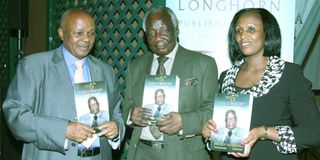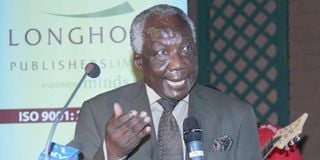Philip Ochieng’s work spoke of a language genius

Longhorn Publishers chairman F.T. Nyammo, Philip Ochieng and Liz Gitonga-Wanjohi, the author ‘The 5th columnist, A Legendary Journalist’ during the launch of the biography at The Stanley, Nairobi, on August 21, August 2015.
What you need to know:
- Philip Ochieng may not have earned a university degree academic, but his writing spoke of a talented man in the language
- He had a restless spirit that saw him move from one foreign university to another.
My first encounter with Philip Ochieng was when I joined the Nation Media Group as a correspondent in 2002.
He was the Revise Editor of the Nation. I had interacted with his columns in the Sunday Nation while studying Literature at Egerton University.
Three students would share the cost of the paper every Sunday mainly to read the “Books” section where some of our lecturers would feature.
The other piece we paid attention to was “The Fifth Columnist”.
We used to marvel at Ochieng’s style of writing and the complex vocabulary.
Many of us thought he was a professor of English. Years later, when I got a chance to write his biography, I learnt that he had no university degree.
Ochieng may not have earned that academic accolade in paper, but his writing spoke of a talented man in the language, which he also taught in his column “Mark my Word” in the Saturday Nation, and every other newspaper he worked for in East Africa.
As a correspondent fresh from the School of Journalism, I found out he was an easy-going person who liked to walk around the newsroom chatting with colleagues.
'Clever lady'
And he laughed after cracking a joke. I had always thought Ochieng was unapproachable, given his style of writing.
So one day, in his usual tour of the newsroom, he approached my desk and greeted me. I showed him a story I was reading in the newspaper and pointed to a sentence that had a parenthetical element. It had the first comma before it but the second was missing. Ochieng was impressed.
“Who is this young clever girl who knows about parenthesis?” he asked.
I introduced myself politely.
“I have lectured journalists countless times about use of the second comma until I have given up,” he said.
From that day, he called me the “clever lady” whenever we bumped into each other. I was humbled.
Years later, I asked Ochieng when we would read his memoirs. I figured that being one of the veteran writers the country could boast of, his book would benefit many journalists joining the trade and those studying mass communication.
“My memoirs?” he asked sounding shocked. “I have never thought of writing my story. If anyone is interested in writing my biography, he or she can go ahead.”

"The 5th Columnist: A Legendary Journalist", Liz Gitonga-Wanjohi’s biography of veteran editor Philip Ochieng.
I jumped at the chance not sure he would rate me good enough to tell his life story.
“You go right ahead clever lady,” Ochieng said.
The rest as the say is history. The 5th Columnist, A Legendary Journalist, the biography of Philip Ochieng, was published three years later in 2015 by Longhorn Publishers.
Dr Joyce Nyairo, then of Ford Foundation, made this possible by giving a grant for the assignment.
In my journey of writing the book, I discovered a new Philip.
Beyond the columns and easy-going manner in the newsroom, I had not fully internalised the extent of his love for books.
On my first visit to his home in Ongata Rongai, I was taken on a tour of the bungalow Ochieng lived with his wife Jennifer Dawa and daughter Judith Aluoch.
Love for books
Ochieng’s library had books from the floor to the ceiling. There was hardly any space left. Aluoch was his librarian.
“She knows where to get a book I want to read,” he said.
Ochieng could read his favourite books several times. Despite being an SDA follower-turned-atheist, Ochieng had read the Bible from cover to cover five times.
“I read it for knowledge,” he said.
His love for books and journalism was unmatched. Ochieng never cared about big cars, apartments in high-end estates or land. He described himself as “an entrepreneurial idiot”.
In retirement, Ochieng lived off the columns he wrote for newspapers. I would drive all the way to Ongata Rongai for an interview scheduled to last two hours but he would at times dismiss me after about 30 minutes if he had not penned his column.
“I want to send you away because I must write my column,” he would say.
So dedicated he was to the columns, which he started writing as soon as he joined the media in 1966, that he penned at least one for every newspaper he worked for in his four-decade career.

Philip Ochieng during the launch of his biography written by Liz Gitonga-Wanjohi at The Stanley on August 21, 2015. The veteran journalist died on Tuesday evening.
Ochieng was brought up in Awendo, Migori county. He topped his class throughout his primary school and was admitted to Alliance High School.
He did his Std Four exams at Manyatta Primary School, only a stone’s throw from his parents’ home.
Ochieng then joined Lwala Primary School, which was seven kilometres away. His dream was to join Pe Hill in Std Six, which would present him with a better chance to join Alliance.
Pe Hill was a top performer but it started at Std Six. Such determination and focus defined Ochieng in his younger years. He topped his class and joined Alliance High School.
Ochieng was a restless spirit, moving from one university to another. He was in the 1959 Airlift organised by Tom Mboya but never completed his course at Roosevelt University in the US.
Later, Mboya would organise for him to join a university in France but he landed in Kenya on the eve of independence and never returned to Europe.
Ochieng taught in secondary schools in Migori and later joined the Ministry of Foreign Affairs as a protocol officer. While at the ministry, he started writing letters to the editor, catching the attention of Nation Editor-in-Chief George Githii.
Githii hired him as a cub reporter in 1966. Ochieng rose in East Africa’s newsrooms, from a cub reporter to a sub-editor, chief sub-editor, managing editor and editor-in-chief.
Retirement home
He also worked as a revise editor and quality control editor for the Nation in his sunset years.
I gained a lot from Ochieng. When I was done writing his biography, he edited it but was a little impatient with some glaring grammar errors.
I am privileged to have documented the story of this great man, a veteran journalist and the country’s best grammar teacher.
Ochieng retreated to the village just a month ago. From my interactions with him and Dawa, Ochieng never imagined himself living in the village.
He left the rural home many years ago and had not put up a house for himself and his family.
Towards the end of his stay in the newsroom in the 2000s, Ochieng – with a lot of pushing from his wife – built a house in Awendo.
Dawa revealed to me that she wondered when Ochieng would agree to move to the village after retirement from the Nation.
Unfortunately, Dawa passed away before they could make the big move.
I learnt with profound sadness of Ochieng’s death on Tuesday evening. May this great rest in peace.
Liz Gitonga-Wanjohi teaches journalism at Riara University




